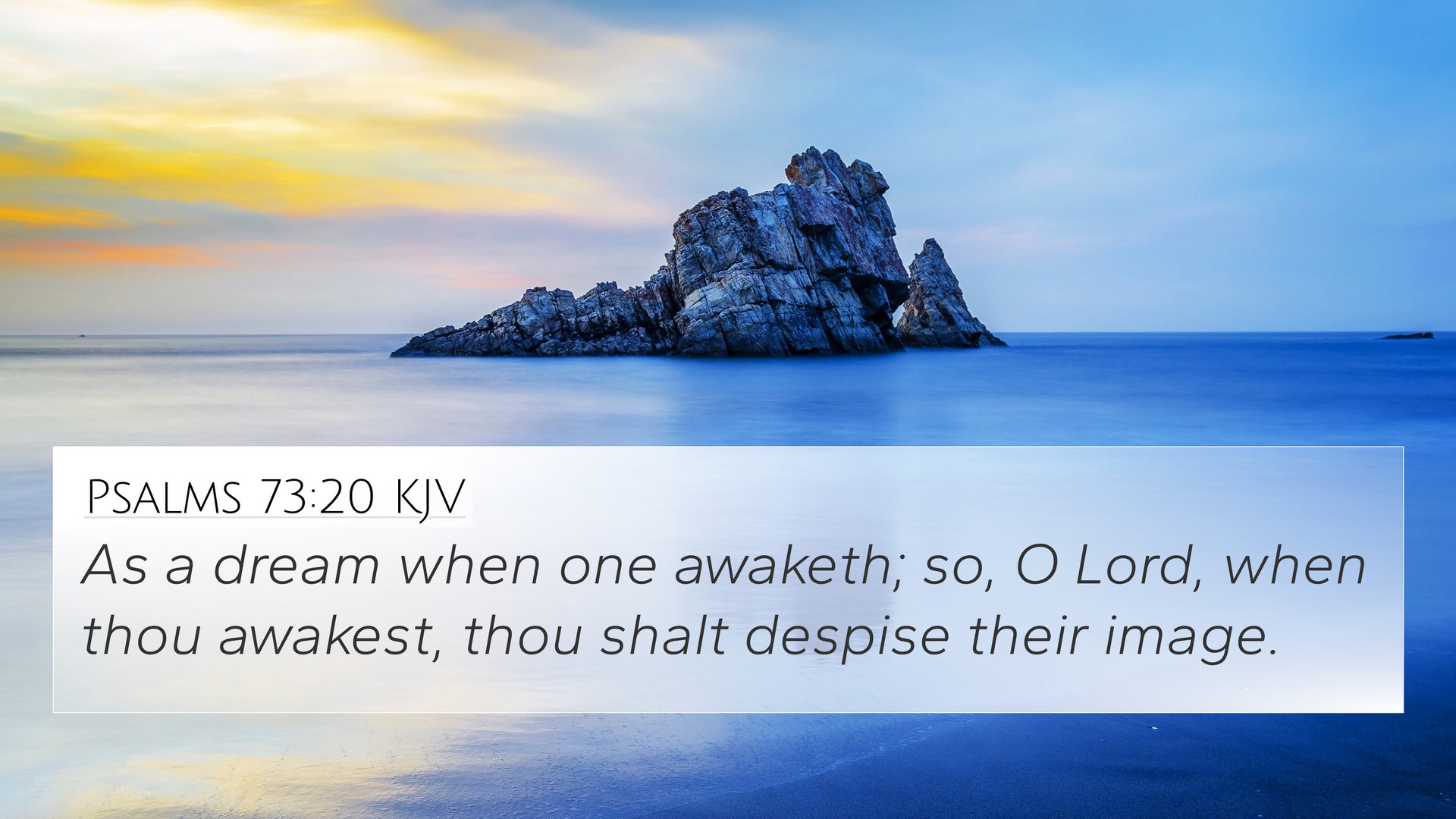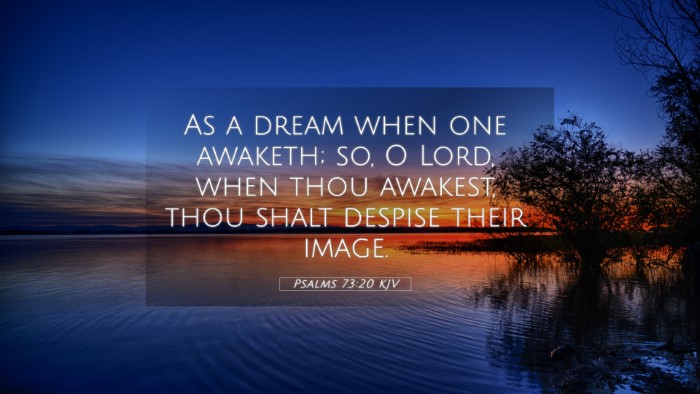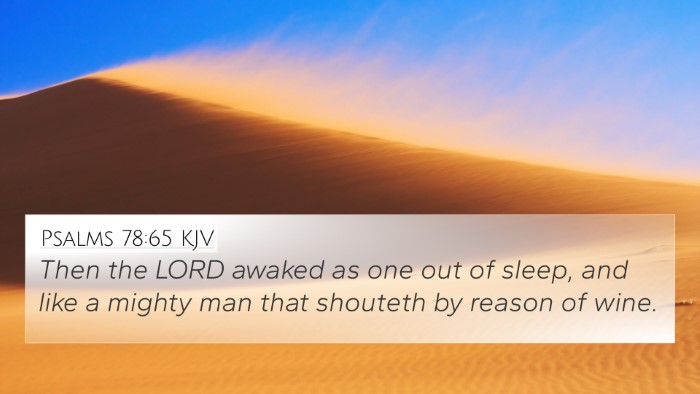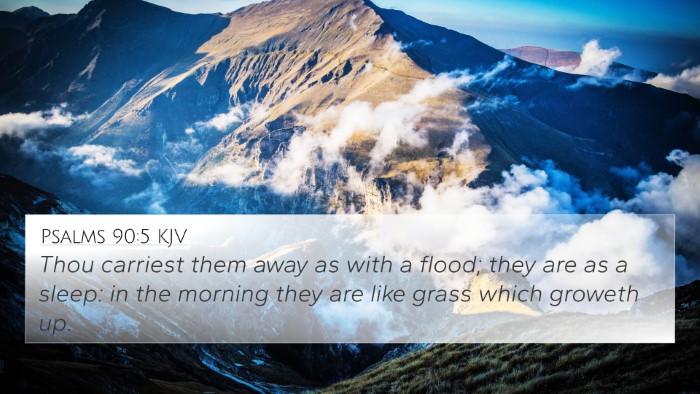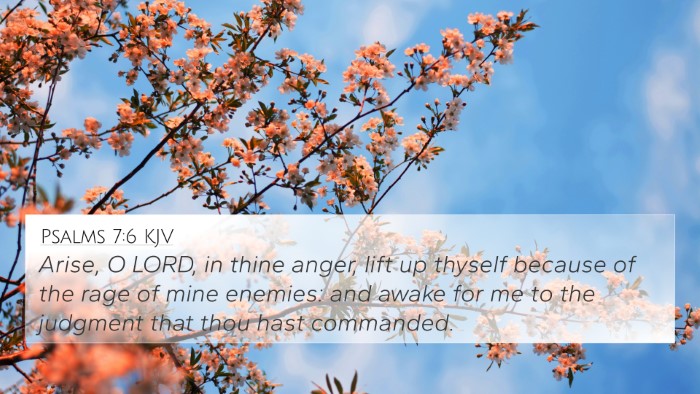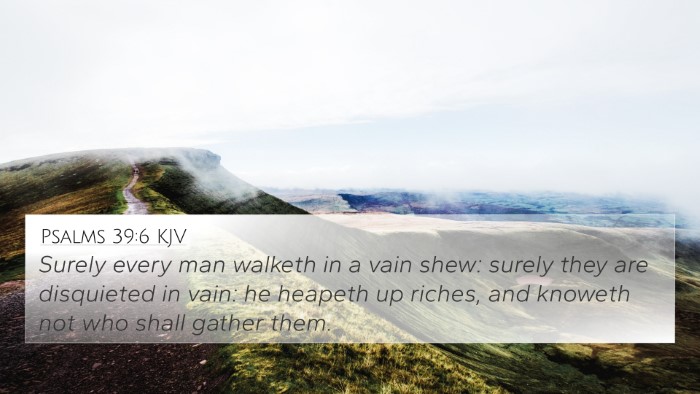Psalms 73:20 - Summary and Commentary
Bible Verse: "As a dream when one awakes, so, Lord, when you awake, you will despise their image." (Psalms 73:20)
Understanding Psalms 73:20
This verse reflects a profound realization by the psalmist, where the transitory nature of the wicked's success is likened to a fleeting dream. The imagery suggests that just as dreams vanish upon waking, so too will the perceived might and arrogance of the wicked be dissolved when God's reality is fully revealed. This realization brings comfort and clarity to the faithful amid the apparent prosperity of the unrighteous.
Insights from Commentators
- Matthew Henry:
Henry emphasizes the psalmist's recognition that the prosperity of the wicked is ultimately illusory and will be brought to justice. He draws parallels with the eventual awakening of God, symbolizing divine judgment, which will dispel the delusion of their power.
- Albert Barnes:
Barnes notes that the phrase "when you awake" signifies a time of divine intervention. Here, the 'awakening' indicates God’s attention to the injustices and His readiness to act on behalf of the righteous, casting away the arrogance of the wicked like a fleeting vision.
- Adam Clarke:
Clarke elaborates on the notion of dreams in this context, understanding them as a temporary distraction from reality. He posits that the apparent success of the wicked will ultimately be viewed as insignificant when contrasted with God’s eternal truth and righteousness, leading to their eventual disgrace.
Related Bible Cross References
- Job 20:5: "The triumphing of the wicked is short, and the joy of the hypocrite but for a moment." - This verse mirrors the theme of the fleeting prosperity of those who oppose God.
- Psalm 37:2: "For they shall soon be cut down like the grass, and wither as the green herb." - A reminder of the temporal nature of the wicked’s success.
- Isaiah 29:20-21: "For the terrible one is brought to naught, and the scorner is consumed; and all that watch for iniquity are cut off." - This verse reinforces the promise of God's judgment on the wicked.
- Proverbs 14:32: "The wicked is driven away in his wickedness: but the righteous hath hope in his death." - The contrast between the ultimate fate of the wicked and hope found in righteousness.
- Matthew 13:30: "Let both grow together until the harvest: and in the time of harvest I will say to the reapers, Gather ye together first the tares, and bind them in bundles to burn them: but gather the wheat into my barn." - Jesus speaks of the ultimate separation and judgment of the wicked and the righteous.
- Luke 16:19-31: The story of the rich man and Lazarus illustrates the ultimate reversal of fortunes in the afterlife, symbolizing the fleeting glory of the wicked.
- Revelation 20:10: "And the devil that deceived them was cast into the lake of fire and brimstone." - Demonstrates the final outcome for those opposing God and their eventual downfall.
Thematic Connections with Other Bible Verses
The themes found in Psalm 73:20 resonate throughout Scripture, illustrating the transient nature of worldly power and the ultimate justice rendered by God.
- Connection with Paul’s Epistles:
In Romans 8:18, Paul reflects on suffering and future glory, asserting that present struggles pale in comparison to coming revelations of God’s truth.
- Connection with the Prophets:
Prophetic texts often discuss the downfall of oppressors (e.g. Jeremiah 51:57), paralleling the promise of God’s eventual judgment on the wicked.
- Linking with New Testament Teachings:
Jesus’ teachings on the Beatitudes (Matthew 5:10-12) emphasize the ultimate blessing of the righteous and the fate of the unrighteous.
Tools for Bible Cross-Referencing
To better understand the connections between Bible verses, employing tools such as a Bible concordance or utilizing a cross-reference Bible study can be invaluable for a deeper understanding.
Cross-Reference Bible Study Techniques
- Identifying Themes: Look for common themes across different books of the Bible to build thematic connections.
- Comparative Studies: Engage in a comparative analysis of related verses to draw out deeper meanings.
- Utilizing Reference Guides: Make use of cross-reference guides to uncover links between verses you may not have considered.
Conclusion
Psalms 73:20 serves as a powerful reminder of the fleeting nature of wickedness and the assurance of God’s justice. By engaging in cross-referencing Biblical texts, one can uncover profound truths that relate to this verse and appreciate the inter-Biblical dialogues woven through Scripture.
